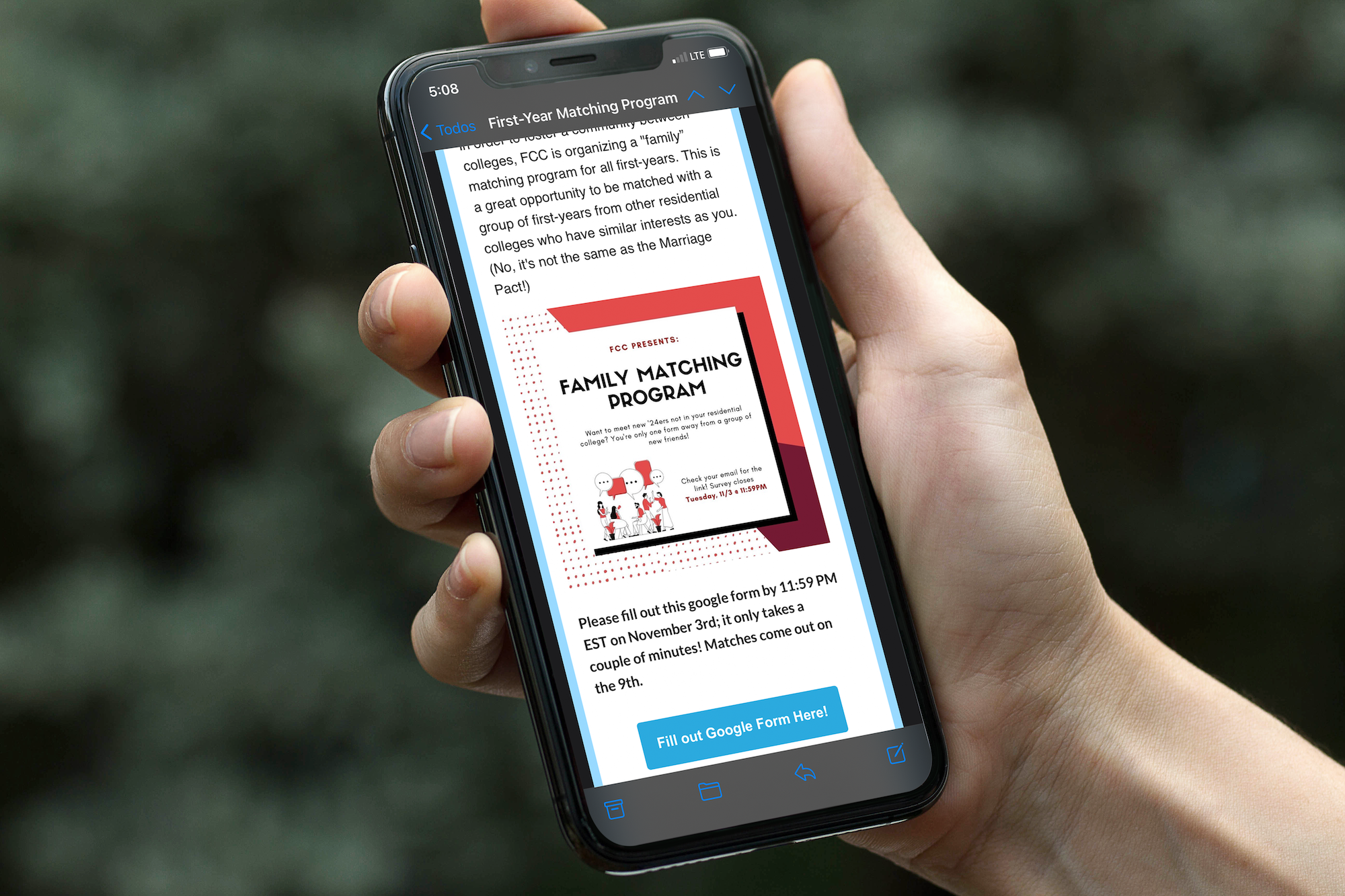
Yale Daily News
On Oct. 28, Yale’s First-Year College Council announced a new inter-residential college Family Matching Program for the class of 2024.
The matching program partners first-year students with similar interests in hopes of increasing unity between residential colleges. To participate, students needed to complete a short Google Form survey by Nov. 3. Some questions included in the form asked students for their residential colleges, Hogwarts house affiliations and favorite music genres. The results of the matching program are set to be released on Nov. 9. Each group will comprise of four to five students across different residential colleges.
“Instead of having to reach out to strangers yourself, we took out that middle step and did it for you,” FCC President Leleda Beraki ’24 told the News. “It’s an easy and stress-free way to get to know people from other [residential colleges]. Plus connections will spontaneously grow from there.”
The FCC Family Matching Program has been in the works for the past three weeks. The idea was first introduced during the first FCC meeting on Sept. 30. Since then, FCC members Gabe Dos Santos ’24 and Lauren Moore ’24, the committee heads of the Family Matching Program, have been working together to plan the project.
The inspiration behind the matching program came from “coffee chats,” an initiative from Morse College — Moore’s residential college — that paired first-year Morsels with one another during their first few weeks at Yale.
“Every day, we were paired up with someone in our Froco group, and sometime throughout the day we would have to meet up and have a chat,” Moore wrote in an email to the News. “It really helped bring the Morse community together. So I put two and two together and we decided to do something similar to ‘coffee chats’ but more widespread.”
Initially, the committee wanted to create a bot that could automatically pair students up based on their form answers. However, due to the limited amount of time remaining in the first semester of the school year, the team decided to simplify the matching program to a Google Form and will be manually pairing students on Nov. 7.
The simplicity of the questions was also intended to promote student participation.
“We wanted simple questions — questions that didn’t take a lot of time to think about,” Dos Santos said. “And we just wanted to make the process of filling out the survey as well to be nice, simple and sweet and fast.”
One big factor in the matching process will be the residential colleges of the students. Dos Santos expressed how many students only have friends from their own residential colleges due to the nature of the two-week-long arrival quarantine period at the beginning of the school year.
Beraki also reflected on her own experiences in trying to meet new people in light of the COVID-19 restrictions.
“Personally, I had a lot of trouble connecting with friends or mentors via Zoom or Instagram DMs,” Beraki said. “It’s just super awkward for me. I know many people who are amazing with this virtual lifestyle, but that’s just not me and tons of first years have the same issue. We are hoping the matching program makes this awkward process just a little smoother.”
The FCC is working on partnering with a few local shops for coupons for the matched groups, according to Moore, but nothing has been set in stone yet.
The FCC matching program is just one of many projects that the FCC has in store for the class of 2024. During the week of Halloween, the FCC organized a spirit week with a different theme each day. Some themes included twin day, pajama day and residential college spirit day.
The FCC also plans to host several other projects to engage students across residential colleges as well as remote students with students studying in New Haven, FCC Vice President Ava Saylor ’24 said. Potential projects include residential college game competitions, a talent show and a merchandise designing competition.
According to Saylor, the FCC hopes to make up for lost events like Bulldog Days and First-Year Formal through the addition of new events that can “help foster growth as a class and the connections within the class.”
“I think the theme [for the FCC’s projects], if there were to be one this year, would be building a community despite one, being apart from one another, and two, despite the hardships that everyone is facing, and three, doing all of that in like a completely safe manner,” Saylor said.
The FCC Family Matching Program received 346 submissions.
Kerui Yang | kerui.yang@yale.edu







